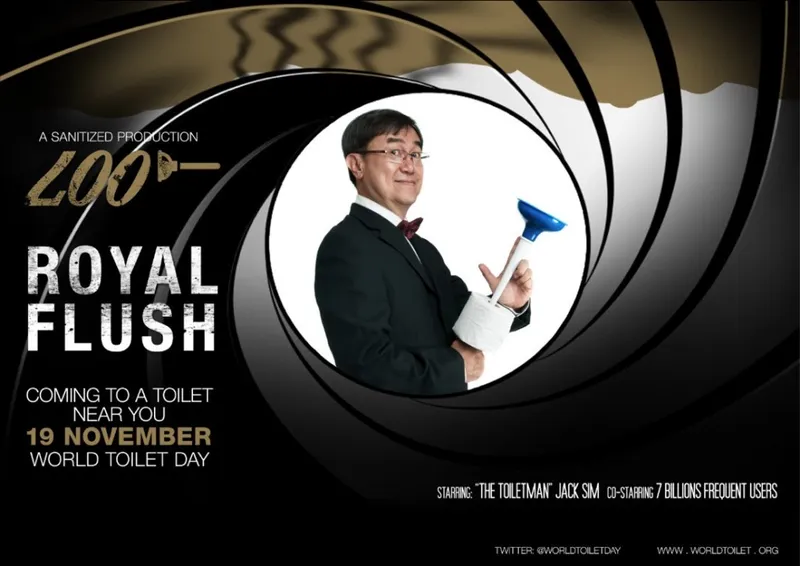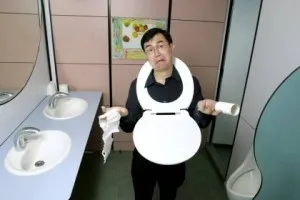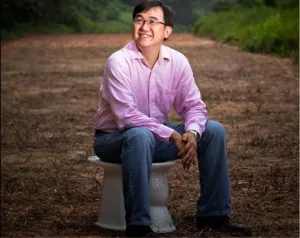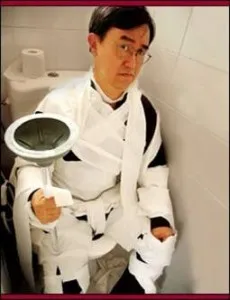In a royal flush with Toilet Man - Jack Sim, Founder, World Toilet Organization
Jack Sim is a funny man tackling a grave situation. He proudly calls himself the Toilet Man who is happily dealing with a lot of sh*t. According to WHO, about 2.6 billion people, half the developing world, lack even a simple improved latrine. 37% of the world population does not have access to basic sanitation facilities and Jack, in his capacity of the founder and head of the World Toilet Organization, urges toilet associations, governments, academic institutions, foundations, UN agencies and corporate stakeholders to help and influence governments to promote sanitation and public health policies.
Jack wants to talk about toilet first and himself later, only if needed (more about Jack and WTO in the end). With World Toilet Day coming up on November 19th (United Nations designated), Jack is a busy man but he always has time to talk about toilets. We went to a royal flush with the Toilet Man, Jack Sim and here is what he shared with us:

SS: You wanted to devote your life to social work after having a glorious corporate career and you had a plethora of issues you could have chosen to work for. What drove you to take up the sanitation and toilet cleanliness problem and devote your life to it?
JS: Yes, the world has many agendas but there are some which are neglected and are the most important ones to handle. In the history of human development, we have seen women liberation – if nobody spoke about it, we would still be treating women as the property of men and they would not have got their equal rights and that would have been an unfair world. World has seen polio, HIV aids, rights for LGBT and all kinds of issues and taboos associated with them in the past. But people stood up to solve the problem by speaking about it. If nobody speaks about the problem, it continues to accumulate because you can’t solve anything unless you talk about it openly. And sanitation and toilet problem was one such problem and I wanted people to speak about it and come together to solve it.
SS: What was the moment of inspiration in which you decided to start the Restroom Association and further go on to found WTO?
JS: We started with just wanting to clean up the coffee shop toilets in Singapore. It is known as the cleanest country in the world but when we started it wasn’t the same. We had clean buildings, clean roads but not the cleanest toilets of the world. Our then Prime Minister Goh Chok Tong said once that we should measure our graciousness against the cleanliness of our public toilets.
I thought to myself that cleaning up public toilets doesn’t mean that only people have to behave properly, you also have to invest to renovate it, layout should be ergonomically proper, the user and cleaner have to have a proper training. You need good design, state of repair, supplies like paper, soap, water and you also need proper ventilation & light. I made an ABC plan – architecture, behavior and cleaning – and I went to the ministry of environment, who was in charge of the toilets and told them that I would like to help them.

They thought I was joking, so they ignored me. I started the Restroom Association in Singapore, registered it and then I went to the newspapers and it got featured on the front cover. Now everybody expected the government to join in and help me in this. After it got to the newspapers, even government could not ignore the subject. It got to their attention and the Director General was very supportive and we got Japanese toilet cleaning trainer to come to Singapore to teach the best practices.
Building owners started to understand that better toilets meant increased incomes as people stayed longer in their restaurants, cafes, shops etc. and they started paying attention to the cleanliness. In the meanwhile, I found out that there were 15 toilet associations in the world without any headquarter. I offered to start World Toilet Organization (WTO). There was a little pun involved for the World Trade Organization as we called ourselves WTO.
SS: How difficult was it to talk about toilets and the taboos associated with talking about this subject in open, in conferences while networking, in forums, on stage, on the dinner tables?
JS: Competition for global attention to issues is very high. It is really hard to get attention to subjects like s*it. You compete sometimes with very charismatic species like the panda, the environmental issue. I observed that the most difficult issue was that the people in the water sector who are supposed to handle sanitation actually refused to talk about it for a very long time. It was also because of the way funding was given to water. They want to fund water because it is glamorous, it is essential, it is a life giving matter, it is a very important subject. Everybody wants to fund water, nobody wants to fund sanitation.
When water and sanitation are put next to each other, it becomes extremely difficult to get attention to sanitation. It is like putting Miss Universe next to my grandmother, everybody will look at Miss Universe. So in this case, it takes a special kind of marketing strategy – guerilla marketing- to get the attention, to get the funding. This issue needed a lot of funding but we didn’t have the money. It was not funny to just go ahead and fund sanitation, so I made it funny – to talk about it and to fund it.
One important thing is being able to laugh at myself to make things easier. If I were conscious about myself, then it would have been difficult. I don’t have this problem, I am not conscious so I make jokes, I make the conversation around the taboo, around sanitation funny and then it becomes much easier to talk about the problems.

SS: What are some of the most absurd situations you have seen while dealing with the problem of sanitation? What about some of these conditions in India?JS: It is very absurd to put all your s*it in your river and then to bathe in it, to do the holy rights in it, to wash your clothes and to wash your babies in the same water. How can you do that? There is a need to protect the water by having proper sanitation systems. It is very difficult to make people understand that the river is present for you to drink the water, it is a source of life. Why would you poison it with all the s*it.
It is very astonishing for anybody to understand, especially in India because the population is so large. For starters, you just need to stop putting all the s*it in the river and then slowly you have to start cleaning it up.
SS: From one person to a network of 200+ organizations in 50+ countries. How did you scale WTO to such a large extent?
JS: We have an open source mindset, which means that we create things and we encourage everybody to do it. We don’t want to be the one and only to solve this problem. We want everybody to take it up, to adopt it and to something about it. People involved and partner organizations understand that this is not an exclusive solution, it is not a problem someone can solve in a non-collaborative manner. We know that we cannot solve it alone.
We are open to suggest ideas to a lot of people. We celebrate the World Toilet Day on 19th of November every year. It is an exchange of ideas, of practices, of approaches to handle the problem and from there on a lot of people join in. They express it in their own way, come up with their own ways to tackle it too.
It is very interesting in a way. When you are not afraid to lose control, then it is much easier. When you are afraid to lose control, then you will be all alone doing things all by yourself and that’s not good.

SS: What channels have helped WTO to not only sustain but to keep growing year on year?
JS: Governments, partner organization and people – all have been very helpful. Fund raising is not very easy. We don’t have a lot of money and very often I have to do it myself. The whole process of fund raising has to be done by leveraging the good willed partners’ support. I never employed a fund raising manager and I think it is one of my biggest mistakes. I am not very good at raising funds and I end up putting my own money in it and making myself poorer and poorer every year. But it is very addictive and also the good will out there is very encouraging, so I am going to employ a fund raising manager now. We are also going to try crowd-funding this year and we hope it works.
SS: Who are some social entrepreneurs you admire?
JS: Sir Fazle Hasan Abed of BRAC is someone I admire. He has brought attention to poverty alleviation to a great scale in Bangladesh. He has 200,000 employees and is still a very humble person. He also does a great job in the sanitation sector.
I have also learnt a lot from Mr. Condom Mechai Viravaidya. He took a subject that is a huge taboo and made a mainstream matter. He is handling it very well and has achieved great success. I am very impressed by his work.
There are many great social entrepreneurs in India. The more problems there are, the more heroes will emerge. However, it is important to scale it up and to achieve scale it is very important not to hold it too close to your chest. You don’t own the problem. Everybody goes together and then solve the problem. The more competition, the better – the problems will be eradicated much faster than we could have ever done it alone.
SS: What would be your advice to the budding social entrepreneurs?
JS: I would tell the young ones to go ahead and work together with the old ones first. Don’t try to do it all yourself because the chances are very high that you are going to find it very tough administratively. Usually, the ideas emerging are very good but they don’t have the back office to operate it and it becomes very difficult. After a year or two, they run out of energy doing it all themselves and then they go back to work. And that is such a waste. They can learn and gain some experience from some more established organizations first.
Don’t do the social work for an ego trip. If you are doing social work, it should be for fulfillment. It should make you feel very nice. It should be mission driven and not ego driven. If you are ego driven, then once there is no more ego boost to gain out of it, you will lose interest.
More about Jack and WTO:
A businessman till the age of 40 with an expertise in marketing, Jack started the Restroom Association in Singapore in 1998 and went on to found WTO in 2001. Currently, apart from advocacy, capacity building and sanitation projects, WTO is driving a market-based strategy to address the dysfunctional sanitation markets for the poor by installing efficient market infrastructures. WTO has started World Toilet College, they organize the World Toilet Summit, an annual international conference to encourage dialogue about sanitation issues and break the taboos of talking about toilets. And also celebrate 19th November as the World Toilet Day every year to spread awareness around the sanitation problems and suggest solutions. Their newest project is SaniShop – a social franchise model which drives down the cost of toilets to an affordable price for millions of people in the under developed regions.
Jack has received many accolades for his efforts but he feels he has just begun his work and there is a long long way to go. He holds recognitions with the likes of Ashoka Global Fellow, Schwab Fellow of the World Economic Forum, Time Magazine’s Hero of the Environment in 2008, Channel News Asia’s Asian of the year in 2009, Reader’s Digest Asian of the year in 2011, Synergos Senior Fellow this year and many more.
Speak up about sanitation problems, talk about toilets and celebrate World Toilet Day on 19th November. Check out WTO here







